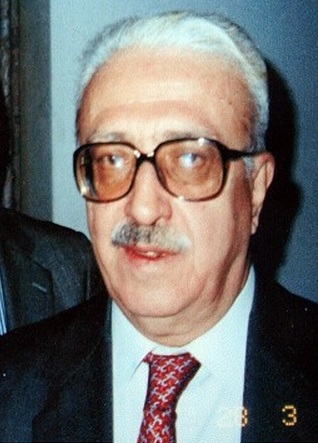Through the Glass Darkly: Tariq Aziz and Iraq’s Tragedy

Image: Tpbradbury
A useful way to start evaluating the disaster in Iraq, and more regionally, should begin with the late Tariq Aziz, born on April 28, 1936 in the town of Sinjar as Mikhail Yuhanna. With his death on Friday came an end to the line of formidable, if blood thirsty Baathist rulers that characterised Saddam Hussein’s rule. It was a rule marked by such individuals of gangsterish proportion as “Chemical Ali” (Saddam’s cousin Ali Hassan al-Majid), and son Qusay, who commanded the Republican Guard.
His own position of power said much. He was of the Chaldean Catholic minority. He was also a survivor, one of those who constituted the system of repression he also managed to evade. He became Saddam’s voice to the foreign community, doubling as both deputy leader and foreign minister.
Despite Saddam’s penchant for bloodthirsty excesses against those within and without his inner circle, Aziz never fell to that casual frivolity that so often resulted in death for those out of favour.
The assassination attempt on Aziz in 1980 at Baghdad’s Mustansiriyah University, instigated by the Shiite group Islamic Dawn, was the reddest of rags to the regime. It led to two fundamental consequences for Iraq, one internal, another external. Internally, it precipitated a brutal outlawing of groups, one that made it a capital crime to be a member of them, be they Communist or rival religious parties.
In terms of regional tremors, the assassination attempt on Aziz by the Teheran-backed group led to an eight year war with Iran. At the very least, it was a good pretext, even if it did result in a chronic, lethal stalemate that cost the lives of a million.
Blood soaked as Saddam’s regime was, maniacal and brutal as the dictator of Iraq proved to be during his rule, Aziz’s passing does provide much food for thought. Not a day passes by without some mention of Islamic State and its handiwork, or the rise of a plethora of Islamic militant groups brandishing swords and knives of delivery and justice.
The Baathist regime of Saddam was the most choking of lids, holding such tendencies down. Its suffocating and stifling tendencies did not merely target secular rival groups, but those who might spring forth with sectarian justification. As Jon Lee Anderson aptly summarises, “Arab Sunnis, Shiites, and Christians, as well as other groups, such as Turkmen, Yazidis, and even Kurds, between their bouts of resistance, made peace deals with the regime and took care to suppress religious militancy in their communities” (New Yorker, Jun 8).[1]
Iraq was always a confection, an entity drawn out by colonial, mainly British, interests centred on oil and realpolitik. It took little heed of the sectarian consequences of lumping the Shia, Sunni and Kurdish blocs into an artificial mass of rivalry and contest. It produced the monster of cruel stability that became the Saddam regime. That own inner logic ultimately led to the country’s destruction with the invasion of 2003 by US-led forces. The lid was lifted; the box’s contents unleashed.
At his trial for crimes against humanity, which took place after Saddam’s execution in 2007, Aziz would use that tried defence of state necessity. Individuals could not be held responsible for targeting and ridding a country of its enemies. It was the logic of a brutal system that produced its own viral responses. Aziz was one of the self-touted anti-bodies.
The other tried and not always successful tactic was one of exoneration and contrived impotence. Yes, Saddam was brutal and murderous in dealing with his enemies, but Aziz did not feel responsible for those actions as such. “It’s been seven years and four months that I have been in prison,” observed Aziz to Martin Chulov in Baghdad in 2010. “But did I commit a crime against any civilian, military or religious man? The answer is no.”[2]
His was the theory of supreme agency, lodged neatly at the top of the totalitarian power structure. People might suggest and offer counsel, but the leader ultimately disposes. “All decisions were taken by president Saddam Hussein. I held a political position. I did not participate in any crimes that were raised against me personally. Out of hundreds of complaints, nobody has mentioned me in prison.”
He straddled the sidelines of history while his leader chugged along. For all that, he would still admit to The Guardian how he “was a member of the Revolutionary Command Council, a leader of the Ba’ath party, deputy prime minister, foreign minister.”
The geopolitical masters of another generation who felt so clever in carving up the Middle East had their own descendants in the form of ruthless, and indifferent agents. “Britain and the US killed Iraq,” observed Aziz in 2010. Having ravaged the country, the departure of those very same forces would be tantamount to leaving the country “to the wolves.” The consequences of those actions have continued, producing their own regional, and seemingly uncontainable monsters.
Dr. Binoy Kampmark was a Commonwealth Scholar at Selwyn College, Cambridge. He lectures at RMIT University, Melbourne. Email: [email protected]
Notes
[1] http://www.newyorker.com/news/news-desk/tariq-aziz-and-the-last-of-the-baathists
[2] http://www.theguardian.com/world/2010/aug/05/iraq-us-tariq-aziz-iran?CMP=share_btn_tw

